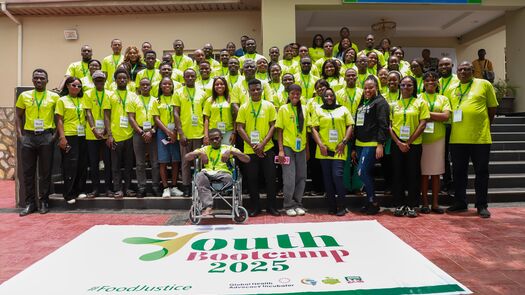November 25, 2025
A healthier future is on the horizon for the people of Ghana, after the country passed the Excise Duty Amendment Act in April. This policy enacts a 20% tax on sweetened beverages, among other products, including fruit juices, energy drinks, and carbonated beverages. The consumption of sugary sweetened beverages (SSBs) is a major risk factor in causing obesity. In Ghana, people are regularly exposed to SSB marketing and celebrity endorsements, making it no surprise that a third of Ghanaians report drinking them multiple times a week.
This bill comes at a critical point as Ghana faces an escalating public health crisis. Ghana has seen the prevalence of overweight and obesity, as well as diet-related noncommunicable diseases (NCDs), skyrocket in recent years, especially among women and children. The repercussions of being overweight or obese, particularly for children, are far-reaching and can lead to the development of other diet-related noncommunicable diseases (NCDs) later in life, such as type 2 diabetes, hypertension, and stroke. While the country historically battled malnutrition, including stunting, wasting and micronutrient deficiencies, more recently, diet-related diseases associated with overnutrition have plagued the country. Since 1993, the prevalence of overweight among women increased from 10% to 40% in 2014 and a 2015 study shows the prevalence of overweight among children is at 43%. Nearly half of adults diagnosed with diabetes are also overweight or obese.
We sat down with Dr. Amos Laar, Professor of Public Health Nutrition at the University of Ghana, a Global Health Advocacy Incubator (GHAI) partner. Dr. Laar is one of the leaders of the Advocating for Ghana’s Health (A4H) Coalition, a diverse body of advocates from academia, CSOs, the medical community and government that successfully advocated for the SSB tax. Here are some excerpts from that interview:
How did the A4H Coalition form and what role did the different actors play in the campaign?
Before this advocacy intervention was implemented by the coalition, a number of us have been active in this space and have been very interested in supporting the Government of Ghana and the Ministry of Health to address the problem of diet-related NCDs in the country. Many organizations had already been working together on the Healthier Diet for Healthy Lives Project, a larger three-year endeavor aimed at supporting the Government of Ghana to develop and implement four food-based policies.
A coalition of academics, who would generate evidence, and of civil society organizations, (CSOs) who are good at doing advocacy but need evidence to carry out their campaigns, led to the marriage of academia and civil society. The academic wing of the Coalition is led by Ghana's foremost university, the University of Ghana School of Public Health, where I work, and has support and contributions from all of the health-facing public health universities in the country. There are a number of partners from civil society including the Ghana NCD Alliance, the Ghana Public Health Association and the Ghana Academy of Nutrition and Dietetics, as well as GHAI, which lent important financial support and technical assistance. Additionally, members of the Healthier Diet for Healthy Lives Project, the Coalition Actors for Public Health Advocacy (CAPHA) and Ghana Medical Association all lent their support to this campaign.
What were some of the key advocacy actions taken by the coalition?
Our approach was a bit unusual. When we got funding, we spent a significant amount of our time trying to get some of the academic outputs, delaying the initiation of the advocacy intervention significantly. We knew that we had to generate local evidence to complement the global evidence that we already have on sugar sweetened beverages. The academic partners had to learn how to become advocates or engage in what others refer to as scholar activism. The GHAI team worked with the academics and CSOs to strengthen their advocacy capacity for the purposes of this campaign. The academic partners generated the evidence used it together with the civil society to sensitize the Ghanaian population. They implemented media interviews and press pieces.
Some key actions we took were to have floats on principal streets in five cities in the country. We also issued position papers at different times of the policy making process, letting key actors know our position. For example, when the Parliament did a second reading of the bill on the 20th of December, we issued a position statement to show our support to the Parliament and to the Government of Ghana. Following that we conducted press conferences and issued press statements to gain media attention. We had various stakeholder engagement events, some of them in person, others virtually, and we continue to do that even after the passing of the bill. We used social media, online blogging and submitted op eds to news outlets to sensitize the public and key stakeholders. We also identified advocacy champions and influencers, including Queen Mothers, nurses, and professors to amplify our message.
Could you comment on the challenges that were faced by the coalition during this campaign? Was there interference from the beverage industry to try and block the bill?
The oppositional argument included the position that this is not the time for this, which was a very powerful argument because in the country currently the economy is on its knees. Opponents were buying into this to let the Ghanaian government know that even if you have to impose the tax on anything, this is not the time. The second reason they posed was that this is going to collapse businesses if a tax like this is imposed. What we did as a coalition was to try to address some of those concerns, not in a combative manner, but any time they released a statement or went to the radio or TV to present their concerns, we also responded indirectly with our statement. In our press conferences we explained that Ghana is not the first and Ghana is not the last country to impose a tax like this. Countries have imposed taxes like this and industries never collapse.
During the third reading of the bill in Parliament, some of the congressmen actually came to the floor prepared to kill the bill. They made it clear to the world, of course, this was telecast and on social media as well, that they had received 17 petitions from industry actors. As far as I'm concerned, in recent memory that was a record number of petitions on a single bill.
Could you comment on the strengths and weaknesses of this bill? How will that inform future advocacy efforts?
Ghana's newly passed 20% tax on SSBs is commendable, as it is one of the highest tax rates in the region. Additionally, the tax extends to a wide range of ultra-processed beverages, including fruit and vegetable juices. The tax is part of the Excise Bill, which also covers alcohol, tobacco, plastics and plastic products. This demonstrates Ghana's commitment to tackling health concerns associated with the consumption of a wide array of harmful products and the environmental impact associated with their production and packaging.
One weakness of the policy we are hopeful will be addressed is the earmarking of the resources to address health related challenges. Currently, that is not visibly articulated in the act. The other weakness is not in the law itself, but the positioning and articulation of government as the owner of this policy. In many interviews rendered by government actors in recent past focus on the revenue generation potential of this policy and not the health benefit. I've never missed an opportunity to let Ghanaians know that there is a public health benefit of a tax like this.
Advocates in Ghana will closely monitor the implementation of the SSB tax and will continue to campaign for it to be strengthened and earmarked toward health expenditures. With the implementation of this tax policy, and the development of other food-based policies on the horizon, the country is well on its way toward creating a food environment that makes it easier for Ghanaians to make healthier choices and reduces the prevalence of diet-related NCDs.




